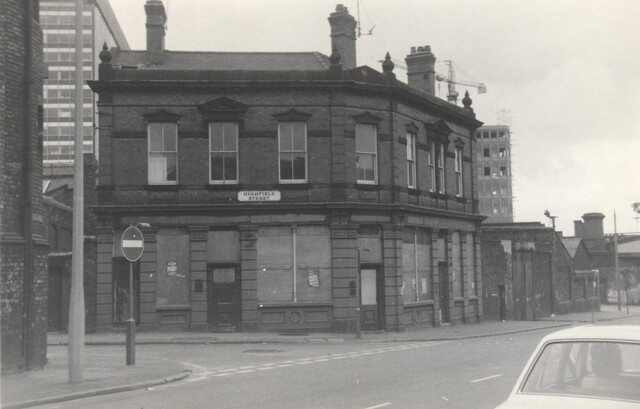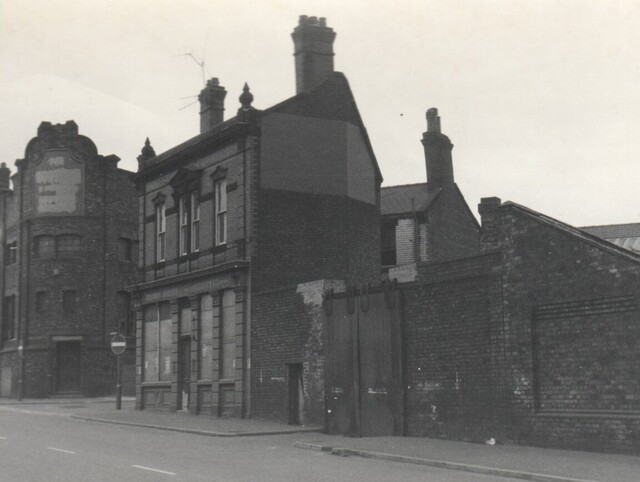» Main Index

» Search This Site

» Submit Update

» Contact Us


|
|

|
Home > Lancashire >
Liverpool > L3
> Coach & Horses
Coach & Horses

|
|
Picture source: Geoff
Smith |
|
|
|
|
The Coach & Horses was situated at 36
Leeds Street. This pub
was demolished to make way for the new Leeds Street dual
carriageway. |
|
Source: Ian Chapman |
|
|
|
My father, Frank Smith, was the
landlord at the Coach and Horses from about 1936 until his death early in
January 1952. My family, with parents and four boys and one girl, lived
above the pub until a year after Frank's death when we moved to Birkenhead.
I was the only one who lived in the pub from birth. After the war the pub
was the home to the very successful Exchange Station Darts team, and their
many trophies adorned the shelves behind the bar. Other regulars were the
drivers from the WHSmith van depot opposite on Leeds Street, and workers
from Costigans grocery warehouse on the opposite corner of Highfield Street,
and from the tenements further up Highfield Street. The occasional rat or
mouse got into the house and I remember that Frank, my Dad, dealt with them
very efficiently with the head of a poker! |
|
Frank Smith (June 2021) |
|
|
| A Window on Leeds
Street (1960s) by Ivy Smith, wife of publican Frank Smith |
There isn't much to
Leeds Street. A drab thoroughfare leading to the city centre from the
Liverpool docks, but it was my home close on eighteen years. 30 years ago,
the only residents were a family who lived in a large house near the
Vauxhall Road end; the tenants of a couple of smaller houses half-way down,
and opposite them a few tumbledown dwellings which housed (if one could use
the term, for they were almost roofless), two or three old people. The
family of mine host of the Coach and Horses completed the tale.
City life was completely new to me when I took my family to live there, and
for a longer time a peculiar trapped hemmed-in feeling persisted. I would
sit watching the waving smoke-shadows from the railway opposite reflected in
a small triangle of sunshine on the wallpaper, and in my imagination they
became the swaying branches of the trees I was used to. Yet it seems now
that I only really lived during those years, so much of the city's
life-blood flowed along the sets of Leeds Street and my window looked out on
to it all. They were happy, eventful years, and I can sympathise with
city-dwellers who, in gaining what the planners call the amenities of a
better environment in far-flung "new" towns, have lost the closeness, the
neighbourliness, and yes the variety which is the spice of
city life.
Almost my first memory is of the grotesque monsters of elevators -- peculiar
electrically driven contraptions which raised the huge tobacco drums in the
bonded stores opposite. They lurched from side to side from one bay to
another like ungainly prehistoric creatures, each with an eye gleaming in
the middle of its "forehead", trailing cable-tails behind them. (Three years
later an isolated raid early in Hitler's war reduced the stores to one bay,
and sliced the front completely from one of the adjoining houses. The
family, including a couple who had been married only that day, emerged from
the back of the house blackened and shocked, but otherwise unharmed.)
One seldom or never sees a horse in Leeds Street now, but at that time much
of the transport from and to the docks was horse-drawn. A common sight, and
a heart-stopping one, was that of a loaded wagon drawn by a pair of sturdy
cart-horses as they raced down the slope under the railway bridge and across
Pall Mall in order to gain sufficient impetus to negotiate the gradient on
the other side - the carter running pell-mell beside it urging on his team.
How often I speculated whether it would reach the top! Sometimes it didn't,
and the grand beasts would slow to perspiring stop, struggling to keep their
feet on the slippery cobbles, to await the good offices of a returning
"empty" and the transfer of a horse to help the straining team until the
summit of the hill was reached.
Or perhaps a steam-wagon from a local mill would act as the Good Samaritan,
backing up behind the loaded cart, taking the weight, pushing gently until
the gradient was conquered. Sometimes I saw those great shire-horses
collapse under the strain, and dying, they were carted away to the knacker's
yard. Much as one regrets the passing of the horse-transport and those grand
men who
cared for them, one cannot but be thankful that the Leeds Street gradient no
longer breaks the heart of man and beast as it did then. Leeds Street was a
children's paradise! How they loved the straight run down the hill, hanging
on to the backs of the wagons and racing up for another ride. And if there
was little of the greenness of the countryside within miles, at least there
was quietness in the street when traffic ceased for the day, and at
weekends.
There was laughter, too, in Leeds Street. As on the day a cattle-truck
carrying live pigs shed its load. The squealing animals scattered hither and
thither, scaring the life out of a trio of shawl-clad ladies, who,
frantically crossing themselves and with many a "Holy Mary, Mother of God",
scattered too. After many vain grabbings at slippery hides and practically
nonexistent tails, the frightened porkers were chased into the yard of the
Coach and Horses and rounded up. The "Courts" at the back of the local
waterworks were demolished many years ago, but at that time "Maidens Green"
(innocent least of any greenery) still housed families in the two up, two
down bathless dwellings with the communal lavatories; and despite the
difficulties and problems of such an existence at least one sturdy couple
reared a family of 17 children in one of them and lived to see them prosper.
...............
From early dawn until the evening the Leeds Street sound continued. Wagon
wheel, clattering hoofs, screeching brakes and clanking chains; the raucous
"Whoa there", and "Giddap" of the men to their horses, and the continuous
clanging of a steam hammer contributed to the din, and above these the more
melodious sound of church bells. An old man reverently doffed his in
acknowledgement of the call to Mass of the bells of St Mary's in Highfield
Street, as he passed the bottom of the street.
The louder and more insistent tones of appeal from Our Lady and St Nicholas
rang out over the river calling to a sailor and landsmen alike. Then came
the war, and the bells were silenced, waiting for the call to sound warning
of an invasion which never came. The usual quiet night in Leeds Street was
filled with the unceasing hum of rolling vehicles carrying guns, planes,
boats, and all the other
paraphernalia of war to the docks. The six years the grim traffic never
ceased along blacked-out Leeds Street, and as there was a heavier drone from
the adjoining waterworks as they turned over their machinery to the
manufacture of "war essentials".
When the blitz came, a shattered railway, bomb-ruined, tobacco-festooned
walls, and a great gaping hole in the street testified to the accuracy or
inaccuracy of Hitler's bomb-aimers, as did the homeless families and later,
a procession of hearses when the Luftwaffe claim a whole street of victims
nearby. My window on Leeds Street was reduced to a small square of glass
substitute, but although I could no longer see it, the dock traffic still
trundled past, and the workers, stumbling over the rubble, still kept the
wheels turning while their families streamed out each night to the
suburbs, many to sleep out under the stars, anywhere from the nightly
onslaught from bombs and mines -- even machine guns. (Leeds Street still
bears the marks of one such low-flying sortie.)
There were flashes of humour even then. The huge plate-glass windows of the
Coach and Horses were shattered, and the manager, cleaning up the debris
after the particularly vicious all-night raid, was greeted by his regulars on their way to work: "You're open
early, boss!"
"Couldn't sleep, lads", was the laconic reply.
Leeds Street is quiet again now -- on occasion it has been too quiet when
the usual stream of the city's traffic is halted, as the war could never
halt it, not by the enemy without, but by the enemy within. |
|
|
|
|
|
|
|
|
Do you have any anecdotes, historical information, updates or photos of this pub? Become a contributor by submitting them here.
|
|
Contacts: |
|
Were you a customer, publican or member of staff
at this pub? Display your email contact details on this page by adding them here and let past regulars get in touch with you. |
| Name |
Dates |
Comments |
|
John Quinn |
late 1950s |
I lived there as a young child, my Dad Tommy Quinn was
the landlord. |
| |
|
Other Photos |
 |
|
Picture source: Geoff
Smith |
| |
| |
|
|